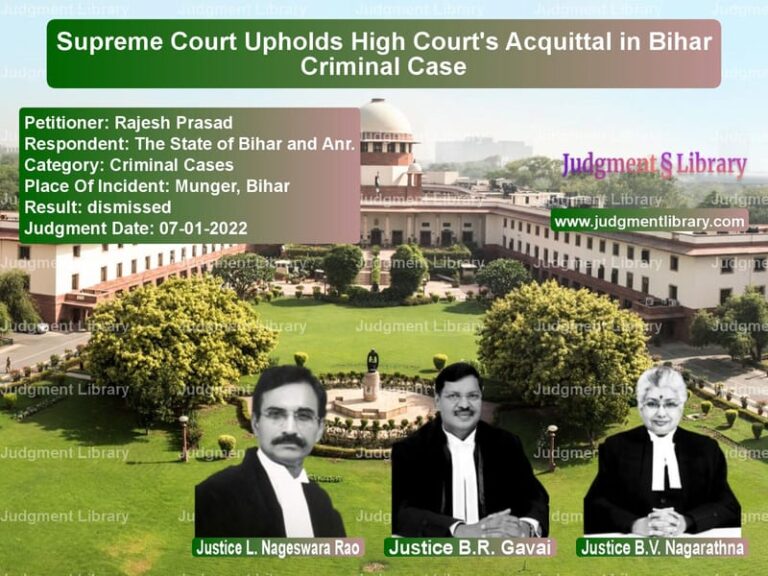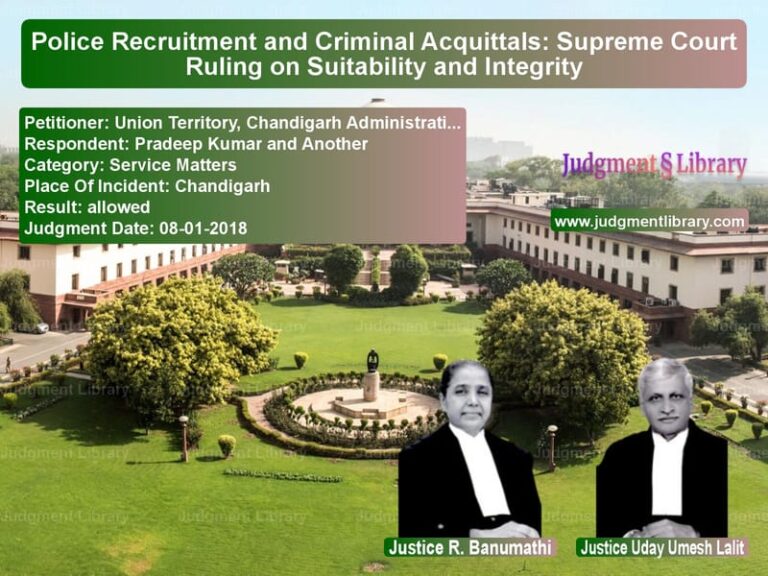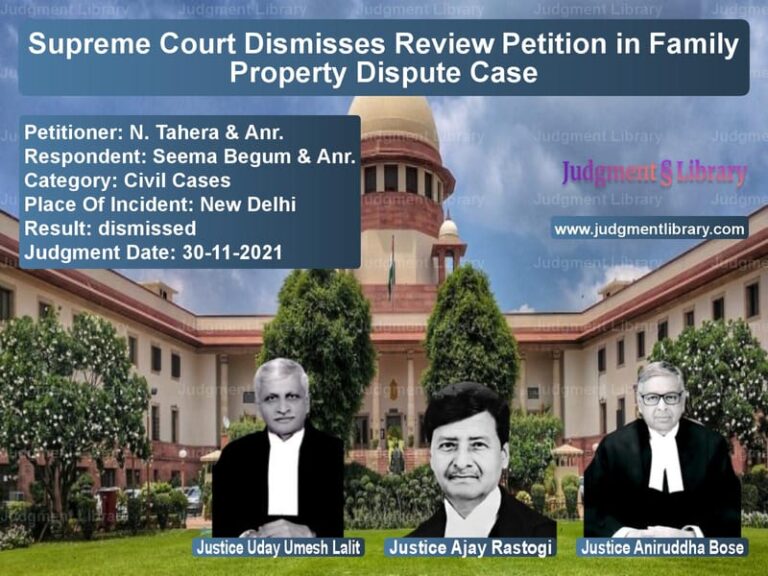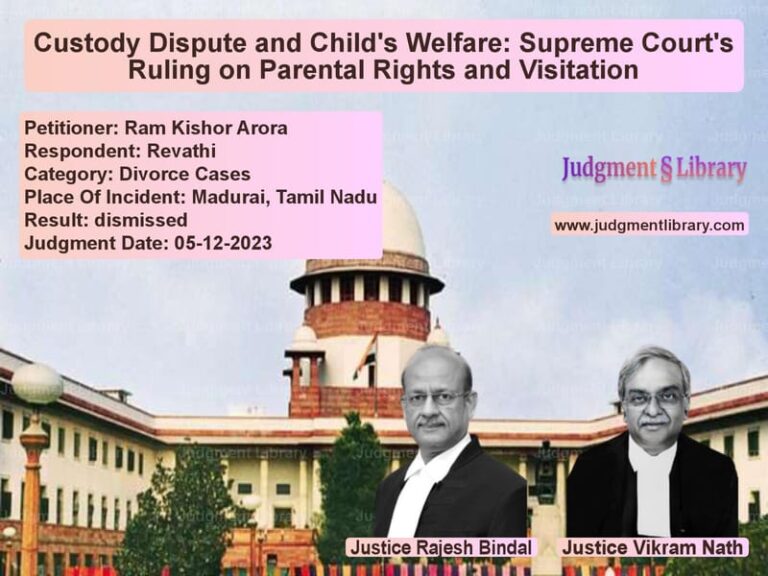Supreme Court Upholds Delhi Sales Tax on Silk Fabrics, Dismissing Appeal by Retailer
The Supreme Court of India has dismissed an appeal challenging the Delhi Government’s levy of state sales tax on silk fabrics, ruling that the tax was legally justified under the Delhi Sales Tax Act, 1975. The case, Saree Sansar vs. Govt. of NCT of Delhi & Others, centered on the legality of imposing sales tax on silk fabrics at different rates over time and whether the tax was restricted by the Additional Duties of Excise (Goods of Special Importance) Act, 1957 (ADE Act).
The Supreme Court upheld the judgment of the Delhi High Court, affirming that the state government was not barred from levying sales tax on silk fabrics during the relevant period. The ruling reinforces the principle that sales tax can be levied by state governments unless explicitly prohibited by central legislation.
Background of the Case
The dispute arose from a series of tax notifications issued by the Delhi Government affecting the rate of sales tax on silk fabrics:
- On March 31, 1999, the Delhi Government issued a notification fixing the state sales tax on silk fabrics at 3%.
- On January 15, 2000, another notification included silk fabric in Schedule I of the Delhi Sales Tax Act (DST Act), increasing the tax to 12%.
- On March 31, 2000, silk fabric was shifted from Schedule I to Schedule II of the DST Act, reducing the tax to 4%.
On October 31, 2001, an assessment order was issued to the appellant, Saree Sansar, demanding sales tax at the rate of 12% for the period from January 15, 2000, to March 31, 2000, amounting to ₹4,22,095.
Legal Challenge and High Court Ruling
1. Writ Petition Before the Delhi High Court
- The appellant challenged the tax assessment by filing a writ petition before the Delhi High Court, arguing that silk fabrics were “declared goods” under the ADE Act and, therefore, could not be subjected to state sales tax.
- The High Court dismissed the petition on October 19, 2006, holding that the levy was valid and not restricted by the ADE Act.
Arguments Before the Supreme Court
1. Petitioner’s Arguments
- The petitioner, Saree Sansar, argued that silk fabrics fell under item 50.05 of the First Schedule of the ADE Act and were subject to additional excise duty.
- Since the ADE Act was enacted to impose uniform duties across India, state governments were not permitted to levy separate sales tax on such goods.
- It was contended that the ADE Act’s scheme of revenue distribution entitled states to a share of the additional excise duty in lieu of state sales tax, making the Delhi Government’s levy unconstitutional.
- The petitioner relied on the judgment in Godfrey Phillips India Ltd. vs. State of U.P., arguing that no state was entitled to impose a separate sales tax if it was receiving revenue under the ADE Act.
2. Respondent’s Arguments
- The Delhi Government countered that silk fabric was removed from the list of “declared goods” under the Central Sales Tax (CST) Act in 1968, allowing states to levy sales tax at any rate.
- They argued that while silk sarees were listed under item 50.05 of the ADE Act, the additional duty payable on the item was nil.
- As a result, the Delhi Government was not receiving any share of ADE on silk fabrics, making it free to levy state sales tax.
- The respondents further relied on a previous ruling in M.R. Tobacco Pvt. Ltd. vs. Union of India, which upheld the Delhi Government’s authority to tax certain goods despite their inclusion in the ADE Act.
Supreme Court’s Key Observations
1. Silk Fabric Was Not “Declared Goods” During the Relevant Period
“Silk fabric was removed from the list of declared goods under Section 14 of the CST Act with effect from May 11, 1968. Therefore, during the relevant period, the Delhi Government was free to levy sales tax at any rate.”
2. ADE Act Did Not Prohibit State Sales Tax
“The ADE Act’s Second Schedule provides for distribution of additional duties among states, but only for goods on which such duties are actually levied. As no additional duty was imposed on silk fabric, the Delhi Government was not receiving any ADE revenue and was not barred from imposing sales tax.”
3. Argument Based on Godfrey Phillips Case Rejected
The Supreme Court distinguished the Godfrey Phillips case, stating that it did not apply because:
- The case dealt with goods actively subject to ADE, whereas silk fabrics were exempt.
- The Delhi Government was not receiving revenue under the ADE Act for silk fabrics.
“The ruling in Godfrey Phillips does not apply here, as silk fabric was neither declared goods nor subject to additional excise duty.”
4. M.R. Tobacco Case Upheld
“The Delhi High Court’s ruling in M.R. Tobacco Pvt. Ltd. upholding state sales tax on certain goods has been affirmed by this Court in Civil Appeal No. 8486 of 2011. The same principle applies to the present case.”
Final Verdict
The Supreme Court dismissed the appeal, ruling:
“The appeal is dismissed. The levy of sales tax on silk fabrics by the Delhi Government during the period in question is legally valid.”
Conclusion
The Supreme Court’s ruling clarifies key tax principles:
- States can impose sales tax unless expressly barred – The absence of silk fabric from the CST Act’s declared goods list allowed Delhi to levy tax.
- The ADE Act does not universally prohibit state taxation – If ADE is not imposed on a good, states can tax it separately.
- State governments retain tax autonomy – Unless explicitly restricted by central law, state legislatures can determine tax rates.
This judgment reinforces the Delhi Government’s authority to levy sales tax on silk fabrics and sets a precedent for similar tax disputes across India.
Petitioner Name: Saree Sansar.Respondent Name: Govt. of NCT of Delhi & Others.Judgment By: Justice Abhay S. Oka, Justice Sanjay Karol.Place Of Incident: Delhi.Judgment Date: 21-03-2024.
Don’t miss out on the full details! Download the complete judgment in PDF format below and gain valuable insights instantly!
Download Judgment: saree-sansar-vs-govt.-of-nct-of-delh-supreme-court-of-india-judgment-dated-21-03-2024.pdf
Directly Download Judgment: Directly download this Judgment
See all petitions in GST Law
See all petitions in Tax Evasion Cases
See all petitions in Judgment by Abhay S. Oka
See all petitions in Judgment by Sanjay Karol
See all petitions in dismissed
See all petitions in supreme court of India judgments March 2024
See all petitions in 2024 judgments
See all posts in Taxation and Financial Cases Category
See all allowed petitions in Taxation and Financial Cases Category
See all Dismissed petitions in Taxation and Financial Cases Category
See all partially allowed petitions in Taxation and Financial Cases Category







